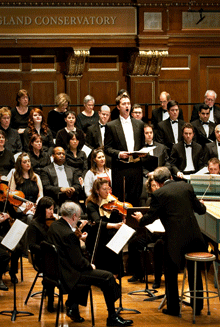It's the two lovers, though, who get — and deserve — the biggest hand. Poppea is the Met's tiny coloratura Kathleen Kim (she was Olympia, the mechanical doll, in TheTales of Hoffmann and Mme. Mao in Nixon in China), a charming comedienne with a stunning technique. Countertenor Anthony Roth Costanzo, articulate, elegant in phrasing, and convincing as the one selfless character in the opera (Ottone), also projects his unique voice like a javelin, with a powerful thrust rare in his vocal category.
Peter Sellars and Craig Smith, in their legendary Handel productions, showed that Handel's three-part da capo arias — in which the last section repeats the first ("from the top") — can be not merely a repetition but a dramatic extension, or undercutting, of what came before. To keep from running into overtime, BLO abbreviated a number of arias, among them Ottone's exquisite song to the murmuring brooks. I missed hearing them complete.

HEARTBREAKER Aaron Sheehan was stellar in the title role of Boston Cecilia’s performance of Handel’s Jephtha. |
For more than four decades, Boston Cecilia's music director Donald Teeters, who's retiring next season, has given Boston some of Handel's greatest music (19 different oratorios and odes, all uncut, and all but three with period instruments). He closed this season with his farewell to Handel, the heartbreaking Jephtha, Handel's own final oratorio, and led it with uncanny subtlety and intensity. The chorus was magnificent, in a work overflowing with magnificent choruses, and so was the orchestra, with concertmaster Daniel Stepner and two phenomenal natural horns, plus some old-timers returning for this grand finale.
And there were some stellar soloists, especially tenor Aaron Sheehan, in the title role, in what is surely his most sophisticated and heroic performance, as the warrior who promises God that if he wins the battle, he will sacrifice the first person who greets him — who turns out to be his daughter, Iphis. He was joined by the outstanding baritone Ron Williams as Jephtha's brother and Williams's masterful 13-year-old son Ryan Williams as the Angel (written for but rarely sung by a boy soprano), who arrives just in time to reprieve Iphis and sentence her to a life of chastity. Soprano Teresa Wakim (Iphis), mezzo-soprano Deborah Rentz-Moore (Jephtha's wife), and countertenor Martin Near (Iphis's boyfriend) are good but solemn singers who didn't convey much distinction between joy and sorrow, a liability in a work that goes to extremes of both.
Boston's two major conservatories recently gave us lively evenings of Broadway musicals: a hit show that's rarely performed and a legendary disaster that turns up everywhere. Boston Conservatory, the city's best theater department, gave us Kurt Weill's biggest Broadway hit, One Touch of Venus, a brilliant score with three ballets, a smart book by S.J. Perelman, and scintillating lyrics by poet Ogden Nash (from "Speak Low": "Time is so old, and love so brief./Love is pure gold, and Time a thief"). The production, at BC's beautiful new theater (still no leg room, though), was thoroughly professional and inventive, and the cast and musicians were impressive and winning, especially in the innovative ballets. (These kids can dance!) Too bad the central role of Venus, a part originally intended for Marlene Dietrich but taken over by Mary Martin (imagine two such opposite stars in the same role!), was played by someone who, despite her looks, good singing voice, and skillful dancing, didn't have the charisma and charm a goddess requires.